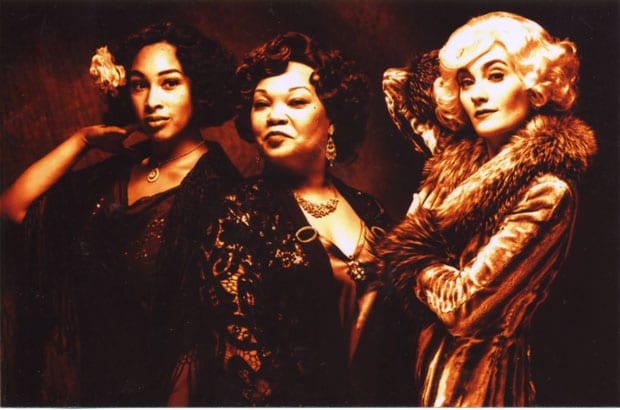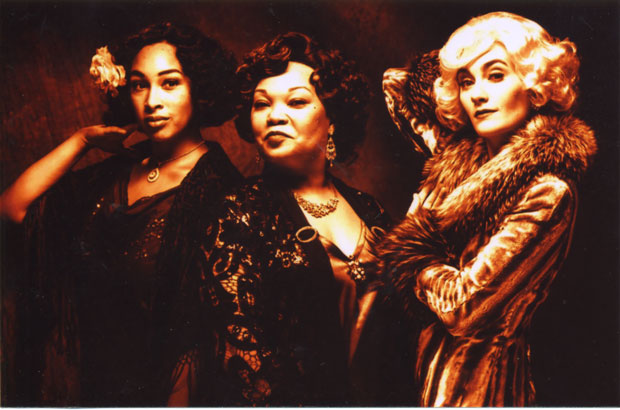The first act of By the Way, Meet Vera Stark — playwright Lynn Nottage’s play about the African-American experience in the 1930s, as lived by black women on the fringe of the movie business in Hollywood — is an intriguing and unexpected comedy played with wit and a veil of pathos. Vera Stark (Yolanda Williams, pictured center) is a housemaid to a popular young starlet — “America’s Sweetie Pie,” Gloria Mitchell (Lee Jamison, right) — who dreams of getting her own break in the movies. It seems unlikely, and not just because good roles for African-Americans are hard to come by; any roles are scarce. Those that are available usually revolve around slavery, or call for Steppin Fetchit-like stereotypes, or are maids (which Vera actually has some experience with). But Vera is savvy and educated and has self-respect. She knows black people aren’t the sum-total of white screenwriters’ limited imaginations, and she wants to nab a juicy supporting role in an upcoming Civil War epic that Gloria is angling to star in. But how can she even get an audition?
There’s a lot going on under the surface in the first half of the play, where even the “liberal” white hierarchy (a European director played by Aaron Roberts; a social-minded studio exec played hilariously by Paul J. Williams) deceive themselves into thinking they “get” what it’s like to be black. The director is such a smug navel-gazer, he can’t even see the “Brazilian” woman he’s been dating (Raven Garcia, left) is really a fair-skinned black woman with a phony accent and a good hair style. The play always seems to be about to get rolling, and it whets your appetite for Act 2.
And that’s when things go swiftly to hell.
Nottage’s at-first sophisticated and thoughtful glimpse of black Hollywood devolved into an over-the-top, not-very-funny sitcom that’s overplayed so appallingly, you keep expecting the script to reveal it’s all a put-on. But that never happens. Whereas Act 1 takes place entirely within a week in 1933, Act 2 is set decades later at a symposium dedicated to analyzing the films of the now-respected pioneer Vera Stark. With “clips” from her final TV appearance on an annoying 1973 talk show, a panel of film and race experts pontificate about who Vera really was, why she eventually disappeared and what her real legacy was.
It could be the hand of the director, Bruce R. Coleman, or the actors, but it feels like the blame for the disastrous turn it takes lies primarily with Nottage. After making cogent, subtle arguments about the shadow of racism and the limits of ambition in the first half, in the second she turns her guns on everyone: On pompous African-American academics who argue with pretentious jargon about side issues while missing what’s in front of their eyes; on the blinders modern-day viewers allow themselves to wear when watching older movies under the guise of “it was another time;” on black women who manage to “pass” for white and ignore their true heritage; on the frivolity of celebrity culture; and on Vera herself, who seems to be some kind of combination of Hattie McDaniel, Eartha Kitt, Dorothy Dandridge and Lola Falana. It’s simply all over the place. (Nottage’s history is likewise a jumble, with sloppy, inaccurate “lessons” about pre-code films, the Academy Awards and more.)
The actors all do good work in Act 1 (especially Jamison, Williams and Stormy Demerson as Vera’s saucy best friend), but by the end, they’ve all been strangled by Nottage’s heavy hand. A smart, poignant tale implodes due to excess and poor judgment, made all the more disappointing because it had such promise.
Theatre 3, 2800 Routh St. in the Quadrangle. Through July 13. Theatre3Dallas.com.
This article appeared in the Dallas Voice print edition June 27, 2014.












